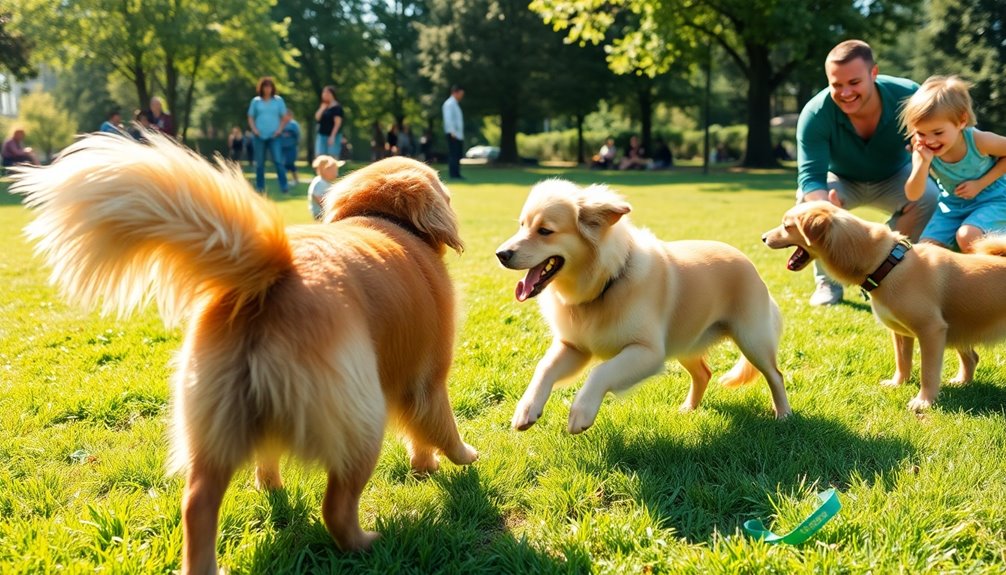Meeting your dog's emotional needs is essential for their happiness and well-being. Like kids, dogs can suffer when they're emotionally neglected, leading to anxiety and behavioral issues. Signs of distress include clinginess, lack of interest in play, and destructive behaviors. To support your furry friend, provide a safe, structured environment with routine activities, socialization, and interactive play. Regular walks and cuddle time enhance your bond and foster emotional security. By being attentive to their needs, you'll strengthen your relationship and help them thrive. Discover more strategies to guarantee your pup feels loved and secure.
Key Takeaways
- Regularly observe your dog's behavior for changes that may indicate emotional distress or unmet needs, such as clinginess or disinterest in activities.
- Ensure consistent routines for feeding, play, and rest to provide stability and comfort, which are crucial for emotional well-being.
- Engage in daily socialization and interactive play to reduce anxiety and strengthen the bond between you and your dog.
- Provide a safe space for your dog to retreat when feeling overwhelmed, along with calming activities to help manage stress.
- Monitor your dog's emotional health and consult with a veterinarian if you notice persistent behavioral changes or signs of anxiety.
Understanding Dogs' Emotional Needs

Understanding your dog's emotional needs is fundamental for building a strong bond and ensuring their well-being. Dogs experience a wide range of emotions, just like humans, and recognizing these feelings helps you create a healthier relationship.
Understanding how to meet your dog's emotional needs means being aware of their feelings of joy, fear, and anxiety.
Emotional neglect can lead to behavioral issues like separation anxiety or aggression, so it's essential to engage with your dog consistently. Remember, a dog's emotional development can be similar to that of a five-year-old child, which underscores the significance of providing emotional support.
Keep an eye out for signs of anxiety, such as clinginess, lack of interest in activities, or destructive behaviors. These signals indicate that your dog might need more attention or reassurance.
Creating a safe and supportive environment, along with structured routines, is fundamental for meeting your dog's emotional needs. By fostering a loving atmosphere, you contribute to their overall happiness and health, ensuring that your bond remains strong and fulfilling.
Signs of Emotional Distress

Recognizing the signs of emotional distress in your dog can greatly improve their quality of life and strengthen your bond. You might notice increased anxiety manifested through pacing, whining, excessive barking, or even destructive behaviors. These actions often indicate your dog's needs for emotional support and engagement.
If your dog is clingy, following you everywhere, it may signal insecurity stemming from an unstable environment.
Take note if your dog shows a lack of interest in walks, playtime, or meals; this can be a clear sign of emotional distress, suggesting they're not mentally stimulated or may be uncomfortable.
Restlessness is another red flag—if your dog can't settle down and is frequently pacing, it's a sign they might be feeling emotionally overwhelmed.
Additionally, destructive behaviors, like chewing on furniture, often arise from stress or boredom. These actions highlight the need for adequate mental and physical stimulation, as well as physical affection to help soothe their anxiety.
Being attentive to these signs is vital in meeting your dog's emotional needs and ensuring they feel secure and loved.
Importance of Socialization

Socialization plays an essential role in your dog's emotional health and overall behavior. It's not just about letting them meet other dogs; it's about creating a well-rounded, confident companion.
Here are four key benefits of socialization:
- Reduces Anxiety: Exposing your dog to various environments and people helps lower their stress and fear levels.
- Enhances Adaptability: Socialized dogs are more adaptable to new situations, making trips to the vet or groomer easier.
- Improves Behavior: Early socialization by 16 weeks can prevent behavioral issues later, like aggression or separation anxiety.
- Strengthens Bonds: Positive social experiences lead to secure attachments with you, contributing to a harmonious relationship.
Regular interactions fulfill your dog's natural curiosity and playfulness, which are crucial for their emotional well-being.
On the flip side, poor socialization practices can lead to increased stress and behavioral problems.
Daily Routine for Emotional Health

Regular walks and structured play sessions not only keep them physically active but also strengthen your bond. Additionally, incorporating puppy training classes into your routine can enhance their social skills and adaptability.
Structured Play Sessions
Structured play sessions are an essential part of your dog's daily routine, ensuring their emotional health and happiness. By dedicating just 5 to 10 minutes each day, you can greatly enhance your dog's quality of life.
Here are four key benefits of structured play sessions:
- Mental Stimulation: Engaging in varied activities like fetch or tug-of-war keeps your dog mentally sharp and reduces boredom.
- Physical and Emotional Connection: These sessions provide both physical exercise and opportunities to bond, strengthening your relationship.
- Tailored Activities: Adapt playtime to suit your dog's age and breed. Younger dogs may thrive on vigorous games, while seniors might prefer gentler interactions.
- Regular Breaks: Incorporate pauses during play to prevent over-arousal and stress, allowing your dog to recharge and enjoy the experience.
Establishing a consistent routine that includes structured playtime fosters a sense of security for your dog, enhancing their emotional stability and trust in you.
Prioritizing these sessions not only satisfies their physical and emotional needs but also creates lasting memories between you and your furry friend.
Consistent Walk Routine
Incorporating a consistent walk routine into your dog's daily life is essential for their emotional health. Daily walks not only provide necessary physical exercise but also offer mental stimulation, alleviating anxiety and boredom. Early morning walks can set a positive tone for the day, fostering security and routine for your dog.
Additionally, individual interaction during walks enhances the emotional bond between you and your dog. This personalized attention helps create a deeper connection. To keep your dog engaged, consider integrating short play sessions, like fetching or exploring different environments. Always ensure that your dog is not exposed to harmful substances during walks, such as toxic foods like grapes, which can lead to serious health issues.
Establishing a consistent walking routine creates stability, reducing stress and promoting overall emotional well-being. Here's a quick look at the benefits of a consistent walking routine:
| Benefit | Description |
|---|---|
| Physical Exercise | Keeps your dog fit and healthy |
| Mental Stimulation | Alleviates boredom and anxiety |
| Emotional Bond | Strengthens your relationship |
| Routine | Creates a sense of security |
| Engagement | Allows for play and exploration |
Tailoring Activities for Your Dog

- Consider Age and Breed: Younger dogs often need vigorous activities like running or fetching, while senior dogs benefit from gentler exercises like short walks.
- Mix It Up: Engage in a variety of activities, such as dog training sessions, interactive toys, and fetch, to keep your dog mentally stimulated and engaged.
- Recognize Preferences: Pay attention to your dog's favorite toys and games to create tailored interactions that enhance enjoyment during playtime.
- Structured Routine: Establish a consistent schedule that includes playtime, dog training, and rest periods, fostering a sense of security for your dog. Additionally, understanding unique needs and preferences can help in customizing activities that truly resonate with your dog's personality.
Ethical Responsibilities of Dog Owners

As a dog owner, recognizing and addressing your pet's emotional needs isn't just a nicety—it's an ethical responsibility. Neglecting these needs can lead to serious behavioral issues like anxiety, aggression, and compulsive behaviors. Understanding dog behavior is essential; misinterpreting stress signals can worsen their emotional distress.
Pay close attention to your dog's body language, as it offers important insights into how they're feeling. Creating a safe and supportive environment is fundamental for fostering trust and security. This enables your dog to thrive emotionally and strengthens your bond.
Engaging in activities that align with their preferences is equally important. Forcing your dog into stressful situations can cause long-term emotional harm, so always consider their comfort levels. Regularly evaluating and adjusting your routines is key to ensuring your dog's emotional needs are met.
This ongoing commitment to their well-being not only promotes happiness but also aligns with the principles of Animal Welfare. By prioritizing your dog's emotional health, you fulfill your ethical responsibilities as a pet owner, ensuring a happy and balanced life for your furry friend.
Building a Stronger Bond

When you invest time in interactive play with your dog, you're not just having fun—you're actively strengthening your bond. Engaging in activities like fetch or tug-of-war promotes physical activity and emotional engagement, vital for building trust.
Here are some key ways to deepen your connection:
- Daily Walks: These not only provide essential exercise but also stimulate curiosity, allowing you to share new experiences together.
- Cuddle Time: Physical affection creates a sense of safety, reinforcing your bond and encouraging positive behavior in your dog.
- Consistent Routines: Establishing regular feeding, play, and rest schedules helps your dog feel secure, leading to a deeper emotional connection.
- Positive Reinforcement: Use treats and praise during playtime to nurture trust. This encourages your dog to engage more with you, enhancing their behavior and your relationship.
Long-Term Emotional Well-Being

To guarantee your dog enjoys long-term emotional well-being, it's crucial to create an environment that supports their needs as they evolve. Establishing a consistent routine for feeding, play, and rest helps your dog feel secure and boosts their emotional stability.
Regularly providing mental stimulation through engaging toys and activities keeps boredom at bay, preventing behavioral issues and emotional distress.
Encouraging socialization is also important. Frequent visits to dog parks allow your dog to interact with other dogs and people, enhancing their social skills and adaptability. This exposure builds confidence and contributes to their overall emotional health.
Using positive reinforcement during training sessions strengthens your bond and fosters trust. Treats and affection can greatly impact your dog's happiness and willingness to learn.
Don't forget to check in on your dog's emotional state regularly. If you notice shifts in behavior or mood, be ready to adjust routines and activities to meet their evolving needs.
Frequently Asked Questions
What Are the Emotional Needs of a Dog?
Dogs have several emotional needs that you should be aware of. They need security, social interaction, and mental stimulation to thrive.
Regular routines, like daily walks and playtime, help them feel safe and loved.
Pay attention to their behavior; signs of distress, like clinginess or lack of interest, indicate they need more emotional support.
Can You Just Say Your Dog Is an Emotional Support Animal?
Sure, you could just slap a "Service Dog" vest on Fido and call him your emotional support animal, right?
But let's be real; that's not how it works. You need proper documentation from a licensed therapist to claim your dog as an ESA.
Otherwise, you might end up in a legal doghouse!
Besides, your pup deserves better—real support, not just a fancy title.
Am I Emotionally Neglecting My Dog?
If you're wondering whether you're emotionally neglecting your dog, it's important to observe their behavior closely.
Look for signs like increased anxiety, clinginess, or destructive actions. If your dog seems uninterested in activities they once enjoyed, that could indicate unmet emotional needs.
Reflect on your interactions and make sure you're providing love, attention, and a supportive environment.
Regularly checking in on your dog's emotional well-being can help strengthen your bond and improve their happiness.
How Do I Meet My Dog's Needs?
Imagine your dog's tail wagging like a flag of joy. To meet your dog's needs, you've got to provide regular exercise through walks and playtime.
Establish a daily routine for feeding and resting to create a sense of security. Pay attention to their body language; it's a window into their feelings.
Engage them with puzzle toys and training sessions, and offer a cozy retreat where they can feel safe and relaxed.
Conclusion
Just like a garden needs sunlight and water to flourish, your dog thrives on emotional nourishment. By recognizing their signs of distress and providing socialization, you're planting seeds of happiness in their hearts. Tailoring activities to their unique needs is like tending to each flower, ensuring they bloom beautifully. As you nurture this bond, you cultivate a lasting companionship, where both you and your dog can enjoy the vibrant colors of joy and well-being together.










